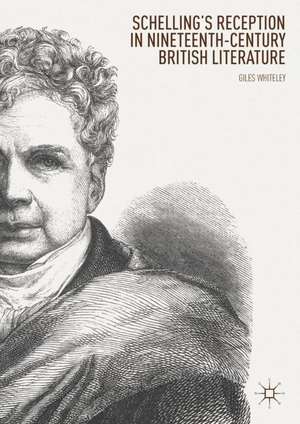Schelling’s Reception in Nineteenth-Century British Literature
Autor Giles Whiteleyen Limba Engleză Hardback – 10 sep 2018
| Toate formatele și edițiile | Preț | Express |
|---|---|---|
| Paperback (1) | 453.78 lei 43-57 zile | |
| Springer International Publishing – 25 ian 2019 | 453.78 lei 43-57 zile | |
| Hardback (1) | 532.23 lei 43-57 zile | |
| Springer International Publishing – 10 sep 2018 | 532.23 lei 43-57 zile |
Preț: 532.23 lei
Preț vechi: 626.16 lei
-15% Nou
Puncte Express: 798
Preț estimativ în valută:
101.84€ • 106.60$ • 84.76£
101.84€ • 106.60$ • 84.76£
Carte tipărită la comandă
Livrare economică 31 martie-14 aprilie
Preluare comenzi: 021 569.72.76
Specificații
ISBN-13: 9783319959054
ISBN-10: 3319959050
Pagini: 211
Ilustrații: IX, 324 p.
Dimensiuni: 148 x 210 mm
Greutate: 0.55 kg
Ediția:1st ed. 2018
Editura: Springer International Publishing
Colecția Palgrave Macmillan
Locul publicării:Cham, Switzerland
ISBN-10: 3319959050
Pagini: 211
Ilustrații: IX, 324 p.
Dimensiuni: 148 x 210 mm
Greutate: 0.55 kg
Ediția:1st ed. 2018
Editura: Springer International Publishing
Colecția Palgrave Macmillan
Locul publicării:Cham, Switzerland
Cuprins
Chapter 1: Uncanny Echoes.- Chapter 2: Schelling’s Reception in British Romanticism, 1794-1819.- Chapter 3: Schelling’s Reception in Scotland, 1817-1833.- Chapter 4: The Plagiarism Controversy.- Chapter 5: Schelling in Berlin.- Chapter 6: The Victorian Literary Reception of Schelling.- Chapter 7: Schelling and British Theology.- Chapter 8: The Legacies of Naturphilosophie and British Science.- Chapter 9: Schelling and the British Universities.- Chapter 10: Schelling in British Mythological and Aesthetic Literature.- Chapter 11: Towards a Modern Reading of Schelling.- Index
Recenzii
“I recommend this book as an interesting and resourceful study to all scholars interested in Schelling and reception history, as well as to Coleridgeans and readers of Anglo-German reception in the Romantic and Victorian period.” (Maximiliaan van Woudenberg, The Coleridge Bulletin, Issue 56, 2020)
“The chapters could easily be read as standalone articles, which makes the work a lot more accessible. The book will be of interest to scholars and students of literature and Romanticism, as well as those interested in the reception of German philosophy in Scotland and England in the nineteenth century.” (Lydia Azadpour, European Romantic Review, July 20, 2020)
“The chapters could easily be read as standalone articles, which makes the work a lot more accessible. The book will be of interest to scholars and students of literature and Romanticism, as well as those interested in the reception of German philosophy in Scotland and England in the nineteenth century.” (Lydia Azadpour, European Romantic Review, July 20, 2020)
Notă biografică
Giles Whiteley is Reader in English Literature at Stockholm University, Sweden. He is the author of Aestheticism and the Philosophy of Death: Walter Pater and Post-Hegelianism (2010) and, most recently, Oscar Wilde and the Simulacrum: The Truth of Masks (2015).
Textul de pe ultima copertă
This book examines the various ways in which the German philosopher Friedrich Schelling was read and responded to by British readers and writers during the nineteenth century. Challenging the idea that Schelling’s reception was limited to the Romantics, this book shows the ways in which his thought continued to be engaged with across the whole period. It follows Schelling’s reception both chronologically and conceptually as it developed in a number of different disciplines in British aesthetics, literature, philosophy, science and theology. What emerges is a vibrant new history of the period, showing the important role played by reading and responding to Schelling, either directly or more diffusely, and taking in a vast array of major thinkers during the period. This book, which will be of interest not only to historians of philosophy and the history of ideas, but to all those dealing with Anglo-German reception during the nineteenth century, reveals Schelling to be a kind of uncanny presence underwriting British thought.
Caracteristici
Offers a coherent narrative of Schelling’s reception spanning the entire period of the nineteenth-century for the first time Demonstrates the central importance of Schelling throughout the British literature of the nineteenth-century Reshapes the narrative of the reception of German idealism during the nineteenth-century as it has been traditionally understood
